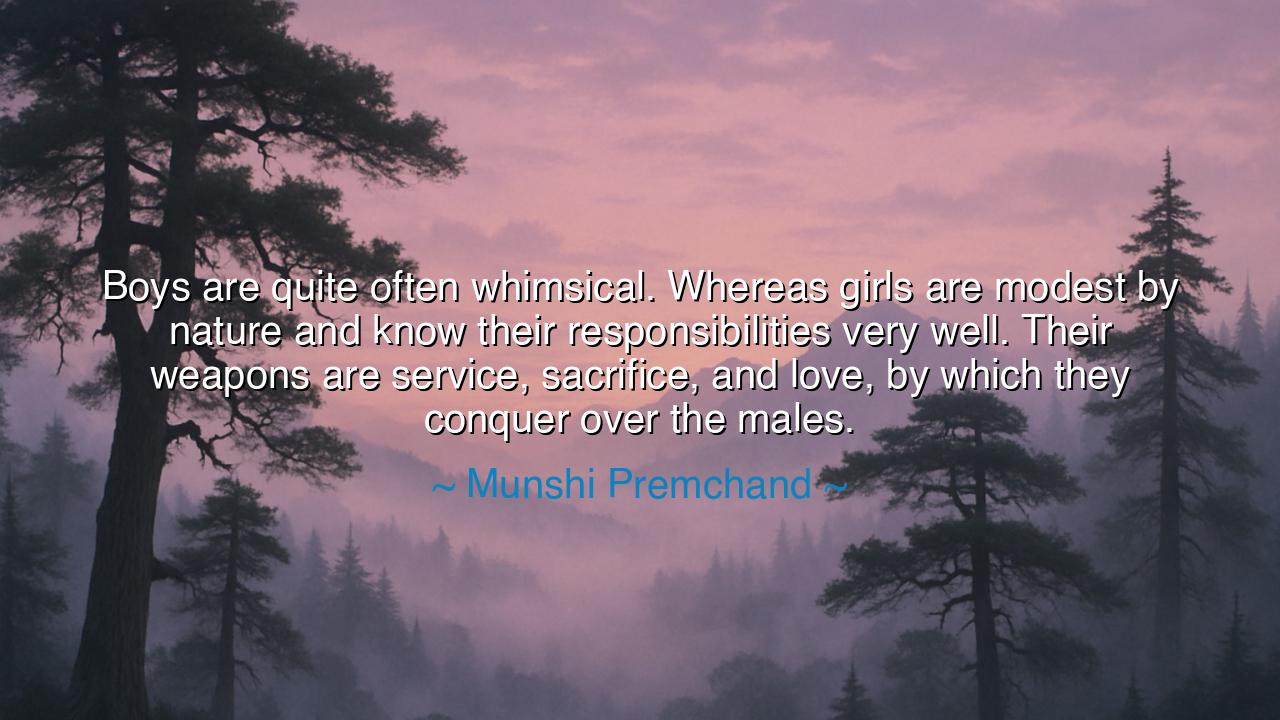
Boys are quite often whimsical. Whereas girls are modest by
Boys are quite often whimsical. Whereas girls are modest by nature and know their responsibilities very well. Their weapons are service, sacrifice, and love, by which they conquer over the males.






In the words of Munshi Premchand, the sage of Indian letters, there flows a truth observed from the fabric of life itself: “Boys are quite often whimsical. Whereas girls are modest by nature and know their responsibilities very well. Their weapons are service, sacrifice, and love, by which they conquer over the males.” This is not merely a statement about men and women, but a meditation on the differing strengths of the human spirit, and on how power often lies not in force but in gentleness, not in dominance but in devotion.
Premchand, writing in the dawn of modern India, had witnessed the struggles of ordinary families and the unrecorded heroism of women within them. To call boys whimsical is to point to the restless, impulsive energy of youth—prone to fantasy, to pride, to chasing desires without restraint. But to speak of girls as modest and responsible is to recognize their anchoring role, often burdened with duties far beyond their years, yet fulfilling them with quiet perseverance. In his eyes, it was the women who held families together, who sacrificed their comforts for others, who loved with a strength that conquered without sword or shield.
The imagery of weapons—service, sacrifice, and love—is deeply evocative. For in every age, weapons are the instruments by which battles are won. Men throughout history have wielded swords, cannons, and armies to secure their victories. Yet Premchand reminds us that women, though denied such tools, conquer by subtler means. Their battlefield is the home, their arena the heart. By selflessness, by enduring hardship, by giving of themselves, they bend even the proudest wills and leave marks deeper than any wound of war.
History is full of examples that illustrate this wisdom. Consider Mahatma Gandhi, whose campaigns shook an empire not with violence but with sacrifice and service. Though not a woman, his weapons were those traditionally associated with feminine strength—love of truth, endurance of suffering, refusal to retaliate. He embodied on the political stage what Premchand saw in the daily life of women. Or think of Queen Elizabeth I, who, though ruling in a world of kings and generals, conquered her nation’s loyalty through patience, intelligence, and devotion to her people, rather than brute force. True power is not always loud; often it is quiet, resilient, and enduring.
Premchand’s words also reflect the cultural context of his time, when women’s sacrifices were often taken for granted. By naming their service and love as weapons, he elevates them to the status of strength rather than weakness. What the world dismisses as soft, he reveals as unconquerable. For who can withstand the one who endures all hardship for the sake of others? What empire, no matter how vast, can outlast the patient, daily victories of love?
The deeper lesson is this: true conquest is not found in domination, but in transformation. To win through fear is to rule only for a time; to win through sacrifice and love is to reign forever in memory and heart. The so-called whimsical nature of boys may seek quick triumphs, but the steadiness of women ensures lasting victories. Premchand’s words remind us that strength wears many faces, and the greatest of them may be the one least adorned with armor.
For us, the practical teaching is clear. Let us honor those who conquer by quiet means—our mothers, sisters, teachers, and all who serve without applause. Let men and women alike remember that service, sacrifice, and love are not the weapons of the weak, but of the truly powerful. In our own lives, let us strive to wield these weapons daily: to serve where others seek advantage, to sacrifice where others hoard, to love where others hate.
Thus, Premchand’s words echo like an ancient counsel: “Their weapons are service, sacrifice, and love, by which they conquer.” Let us remember that the greatest victories are not written in chronicles of war, but in the hidden stories of devotion, where one soul gives itself for another, and in doing so, conquers the very world.






AAdministratorAdministrator
Welcome, honored guests. Please leave a comment, we will respond soon